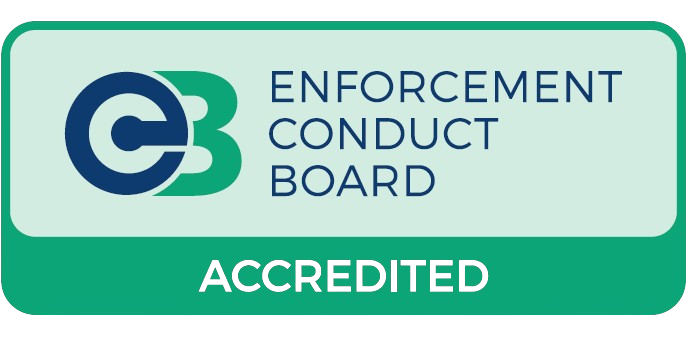A Landlord’s Guide to Lease Enforcement and Tenant Arrears
This independent guide outlines the legal options available to landlords when tenants fall into arrears. It covers statutory methods such as CRAR, alternative remedies, and key conditions for lawful enforcement without going through court.
CRAR allows landlords to recover unpaid lease dues by taking control of goods—without legal proceedings—if strict conditions are met.
When Can Enforcement Be Used?
- Lease must be in writing and relate to purely commercial premises
- At least 7 days of arrears must be owed
- Only principal rent is enforceable—excluding VAT and service charges
- Process must be carried out by certificated enforcement agents
CRAR Procedure at a Glance
- Serve a 7-day Notice of Enforcement to the tenant
- If unpaid, agents may attend and take control of goods
- Goods can be removed and sold
- Proceeds used to offset arrears and enforcement costs
This resource is for general guidance only. If you need enforcement assistance, visit our dedicated CRAR service page or consult a solicitor.

- Applies only to commercial leases
- Does not require court proceedings
- Only applies to overdue rent—not service charges
- Requires certificated enforcement agent
10 Things You May Not Know About CRAR
Familiar with the basics? Whether you're a landlord, managing agent, or legal advisor — here are some key legal facts about CRAR (Commercial Rent Arrears Recovery) that might surprise you.
🏢 1. It applies only to business-use premises
This statutory option is limited to properties used exclusively for business purposes — it can’t be applied to mixed-use or residential arrangements.
[TCEA 2007, Sch 12, Para 3]
⚖️ 2. Court action isn’t needed
Property owners can use CRAR without a possession order or court judgment, provided the legal framework is followed.
[TCEA 2007, s.72]
💷 3. It only applies to basic contractual sums
CRAR is limited to the core lease charge, plus VAT and interest. It doesn’t cover service charges, insurance, or other add-ons.
[TCEA 2007, s.77]
📝 4. A written lease is essential
CRAR can only be used when there is a valid, written lease agreement — not for licences or verbal contracts.
[TCEA 2007, s.76]
📨 5. A formal notice must be served
The occupier must receive a minimum of 7 clear days’ notice (excluding Sundays and bank holidays) before any action can begin.
[Taking Control of Goods Regs 2013, Reg 6]
🚫 6. Insolvency puts CRAR on hold
When the tenant is in administration, liquidation, or under a Company Voluntary Arrangement (CVA), CRAR cannot proceed without express consent.
[Insolvency Act 1986, Sch B1, Para 43]
👤 7. It only applies to the named leaseholder
Only the direct tenant under the lease can be pursued. However, in some cases, notice may be served on subtenants for redirection.
[TCEA 2007, s.81]
🚐 8. Goods can be taken from outside the building
Enforcement agents are permitted to seize goods either inside the premises or on the public highway immediately adjacent (e.g. vehicles or equipment).
[Taking Control of Goods Regs 2013, Reg 12(2)(b)]
📋 9. Only certified agents can act
This process must be handled by a Certificated Enforcement Agent — landlords cannot take action personally.
[TCEA 2007, Sch 12, Para 3]
💰 10. There’s usually no upfront cost to the landlord
CRAR fees are recoverable from the tenant as part of the process, so the landlord typically pays nothing unless enforcement is unsuccessful or withdrawn early.
[Taking Control of Goods (Fees) Regs 2014]
CRAR – Frequently Asked Questions
CRAR stands for Commercial Rent Arrears Recovery — a legal framework that allows a property owner to instruct enforcement agents to act when lease payments are overdue, without needing court proceedings.
The lease must be written, and the unpaid amount must relate to the primary lease charge. A minimum of 7 days' arrears is required to begin the process.
No. It’s a statutory procedure that operates outside the courts — provided all legal conditions are satisfied.
Only premises used solely for business purposes are eligible. Properties that include residential use are excluded.
At least 7 days of core lease fees (excluding service charges or extras) must be outstanding to proceed.
No. Only the main lease fee and accrued interest can be enforced under this route. Extras like insurance and VAT fall outside the scheme.
It's a formal warning given to the occupier at least 7 clear days before agents may attend. It must follow strict timing and content rules under enforcement law.
Only Certificated Enforcement Agents are permitted to carry out this process. Landlords must not attempt to act directly.
Agents may take control of goods that belong to the occupier, are not exempt, and are located on the business premises or highway. Certain tools and essentials are protected.
If the process is used improperly — such as at a non-qualifying address or without notice — the landlord or agent may be liable for damages or regulatory breaches.



